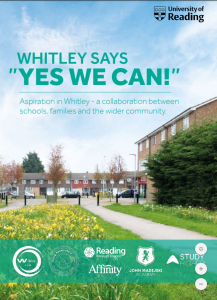“Our research centres on collaboration, co-production and participation to help local communities and organisations understand and tackle the complex issues surrounding wellbeing and social exclusion in Reading. By training local communities in all aspects of the research process, from design and data analysis to report writing and dissemination, we’ve empowered the community to take action themselves to shape local service provision and policy.” – Dr Sally Lloyd Evans.
The project began with the community of Whitley, which is located to the South of Reading town centre and stretches down to the M4 between the two main roads south (the A33 and Shinfield Road).
Whitley community is variously described as ‘working class,’ ‘disadvantaged’ or ‘deprived,’ and has an ONS socio-economic classification of mostly categories C2, D and E. Communities such as Whitley tend to be described in the language of ‘deficiency’ with a focus on the attributes it lacks, and this is often interpreted as a catalogue of weaknesses within the resident population. The stigma arising from this kind of approach can act as a real drag on the way people feel about themselves and about their future.
Our research rather seeks to engage with and build upon the community’s assets. It partners with existing community groups, and it focuses on Whitley’s people. It is committed to working together in a friendly and inclusive way where everyone’s work is equally valued. This encourages the whole collective to speak up and to grapple with the real issues, rather than getting superficial responses to the wrong questions. The University of Reading equips the local residents with participatory research methods, and strengthens their networks with local service providers. The local residents use their personal connections to access the opinions and experiences of a much wider cross-section of the community. All this gives voice to the local community, puts ownership into local hands, and builds channels of communication through which all parties can engage with change.
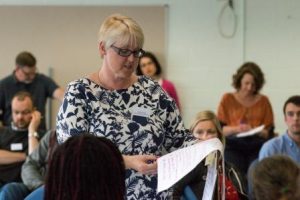
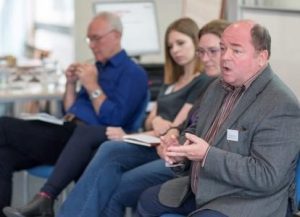
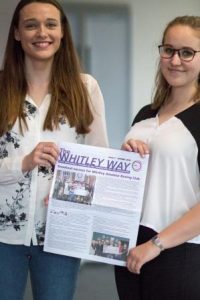
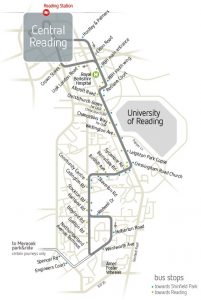
The story of how the community-based research project has developed in Reading:
In 2014, Sally was approached by John Ord, the Whitley Big Local Representative, and Whitley Community Development Association (WCDA) to facilitate a community-led research project to tackle social exclusion and mobility in Whitley. One of the project’s aims was to understand the travel needs in Whitley and identify transport barriers that could be addressed. The project was part of the Whitley Big Local initiative, funded by the National Lottery’s £1 million grant to 150 disadvantaged communities in the UK, empowering them to help themselves and build close community ties.
This project marked the genesis of the community research network, the Whitley Researchers. From the beginning, the researchers have worked part-time hours to suit their lives, and are paid the Reading living wage. The Whitley Researchers are part of WCDA, and partner with the University of Reading – interacting with a rolling succession of student researchers as well as with staff.
The output from this initial research project led to immediate change for the community, with the local transport authorities working to change the bus routes through Whitley, allowing residents better access to schools, work and the hospital (the new bus route is pictured above!). Moreover, the researchers gained new skills and the partnerships continued to develop. It became noticeable that the collaborations with various organisations connected with and fed each other – a clear feature of participatory action research is its capacity to build trusted relationships, networks and contacts.
| “Having something solid, well consulted, well written and well supported by your community makes you successful. It then gives statutory authorities, bodies and businesses no choice but to listen to you.” – Whitley Researcher
|
Since the initial transport project the Whitley Researchers have been involved, in partnership with relevant community groups, in researching financial exclusion, diet, barriers to employment, ways in which particular leisure or community-building activities enhance wellbeing or engage with the local population, a wide range of issues surrounding youth aspiration and attainment and, in 2020, life under lockdown. Reports on many of these research initiatives can be found in the publications section of this website.
During the course of the youth research and with the full collaborative support of the John Madejski Academy, a new research group could evolve which was named the ‘Young Researchers’. The Young Researchers mirror the concept of the Whitley Researchers but give a voice to young people – see the Young Researchers section of this website. The youth work highlights how strongly youth aspirations (and indeed, all of our aspirations) depend on the following:
- Place: The ideas, constraints, role models and opportunities that we are exposed to as we grow up shape our choices;
- Relationships: Positive and collaborative two-way communication with (and between) the people in our lives makes a huge difference to our outlook;
- Pathways: having aspirations is only part of the story – most of us need a little help in exploring the pathways to fulfilling our dreams too;
- Voice: Being given the opportunity to speak for ourselves and pursue our own interests
(with consideration for the interests of others) allows us to develop and thrive as people…
The collaboration between schools, families and the community continues to be strengthened as the recommendations arising from this report are worked out using the collaborative structures that the initial research phase had begun to build.
The university and community support team

